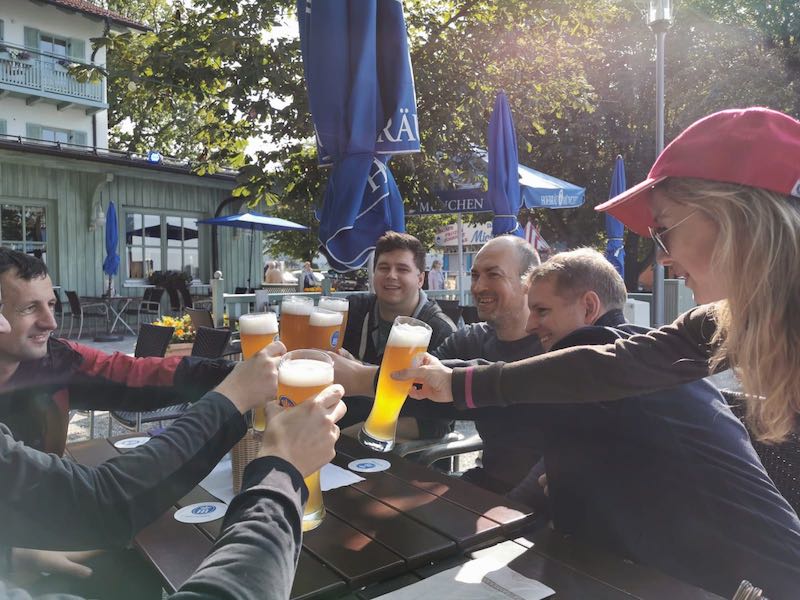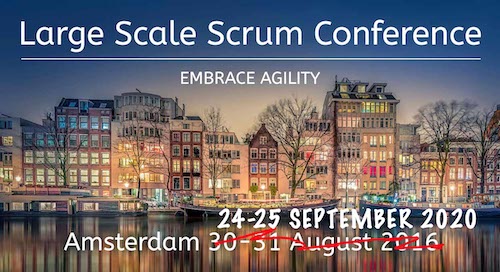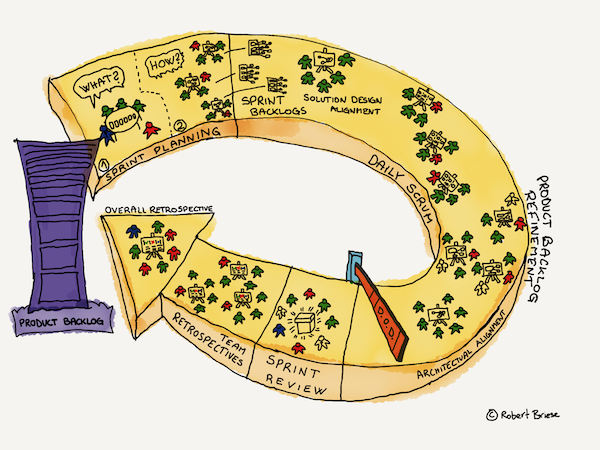LeSS Newsletter - February 2020
26/02/2020Reflection 2019
 Every first newsletter of the year always starts with a reflection of the previous year. But it is almost March, so this feels a bit late. Luckily I (Bas here) only recently learned that March used to be the first month of the year, which makes OCTober the eight-month. I'm disappointed in myself for not recognizing that earlier.
Every first newsletter of the year always starts with a reflection of the previous year. But it is almost March, so this feels a bit late. Luckily I (Bas here) only recently learned that March used to be the first month of the year, which makes OCTober the eight-month. I'm disappointed in myself for not recognizing that earlier.
I'll keep this reflection short as we have a lot of great content in the newsletter. In the first half of 2019, I have spent most of my time in a LeSS adoption at a large bank in Singapore. I've enjoyed this engagement a lot and considered it both a success and a failure. Most of the people involved will continue the work that we started there and in other places. There will be a case study about it in the coming years (not written by me). In the second half, I had to catch up with a lot of work, ideas, and experiments that had piled up during my 1.5-year coaching engagement. I managed to increase my writing on the LeSS blog, supported some of the candidate LeSS trainers and Scrum trainers, and gradually work more on my own case study. Hopefully, that case study will be published this year. It will be huge. This year, I'll be moving from Singapore back to the Netherlands and during 2019 we started the preparations for that.
The growth of LeSS in the world has been steady. We've published several more thorough LeSS case studies. There was growth in both Certified LeSS Practitioners and Certified LeSS Trainers. The number of new LeSS-Friendly Scrum Trainers was also significant in 2019. With that, a lot more LeSS-compatible Scrum courses. An interesting change in 2019 is that we've observed more top-down management-driven LeSS adoptions some of them started based on recommendations from management consulting firms. We've not yet concluded whether that is a good or a bad thing.
 In 2019, we secretly introduced the Certified LeSS Coach. These are people who work in Certified Coaching Companies and their companies have evaluated them as having deep knowledge and experience in LeSS. Over the next years, we'll develop this concept further. But at the moment, the only thing they can do is add Supporting Courses on the LeSS site. These are mostly courses related to technical excellence. The LeSS site saw many small features towards improving stability, user-friendliness and better supporting the LeSS conferences. For the 2019 Munich conference (which was wonderful!), we've put the Open Space sessions online afterward and for Amsterdam 2020 we will likely try to mirror the Open Space time-space matrix online. That'll be a fun experiment!
In 2019, we secretly introduced the Certified LeSS Coach. These are people who work in Certified Coaching Companies and their companies have evaluated them as having deep knowledge and experience in LeSS. Over the next years, we'll develop this concept further. But at the moment, the only thing they can do is add Supporting Courses on the LeSS site. These are mostly courses related to technical excellence. The LeSS site saw many small features towards improving stability, user-friendliness and better supporting the LeSS conferences. For the 2019 Munich conference (which was wonderful!), we've put the Open Space sessions online afterward and for Amsterdam 2020 we will likely try to mirror the Open Space time-space matrix online. That'll be a fun experiment!
LeSS Supporting Courses, LeSS-Friendly Scrum Courses, and Events
During 2019, we had more requests for courses that support LeSS. Related to that, we had an explosion of courses offered as events on the LeSS site. During 2020, we will try to improve on both of these fronts.
The LeSS Trainers identified that not enough focus on technical excellence is one of the most common mistakes in the LeSS adoptions. Therefore, we want to support more coaching and education related to technical excellence. As an experiment, we introduced the Certified LeSS Coach and have a new section on the LeSS site for Supporting LeSS courses. These could be any courses supporting LeSS adoption, but our main focus is on courses that improve technical practices.
In several LeSS adoptions, we've had requests for LeSS-compatible Scrum courses. Although we've had these (LeSS-Friendly Scrum Courses) for a while, last year saw a growth in the number of requests for them. To briefly explain what they are and why we recommend to only chose LeSS-Friendly Scrum Courses for Scrum courses when in a LeSS adoption; LeSS-Friendly Scrum Courses are courses taught by Scrum Trainers (either Scrum Alliance, Scrum.org, or candidate LeSS trainers) who have fulfilled the criteria for being LeSS-Friendly. These criteria include going through at least two LeSS courses, reading the LeSS books and having their courses evaluated on LeSS-Friendliness. Currently, they can post their Scrum Master courses online and do LeSS Basics courses. This year we'll expand that to also include some other courses offered by Scrum Alliance and Scrum.org.
People can post events on the LeSS site. These will be announced to other LeSS practitioners within the same geographical region. Our goal was to connect people in the same region. When we started, we also wanted people to announce LeSS-related courses. Unfortunately, the events list now mostly consists of courses. During 2020, we'll remove the ability to post courses as events and instead either remove them or move them to Supporting Courses and LeSS-Friendly Scrum courses. By doing this, we hope that the events section becomes clearer and better enables LeSS Practitioners to find peers.
LeSS Conference and other large LeSS events
 The LeSS Conference 2020 will return to Amsterdam - the city of the first LeSS Conference. When? 24-25 September. We're taking talk proposals, designing the program, thinking of new experiments. The only sessions confirmed are talks by Bas Vodde and Craig Larman. If you want to propose a session, please do that here. We especially value experience sharing sessions of LeSS adoptions. The registration is already open and there is a participant limit, so register early.
The LeSS Conference 2020 will return to Amsterdam - the city of the first LeSS Conference. When? 24-25 September. We're taking talk proposals, designing the program, thinking of new experiments. The only sessions confirmed are talks by Bas Vodde and Craig Larman. If you want to propose a session, please do that here. We especially value experience sharing sessions of LeSS adoptions. The registration is already open and there is a participant limit, so register early.
Some of the LeSS Conference Munich sessions were recorded and they are now published on InfoQ. You can find them here.
Next to the LeSS Conference, there are two interesting and relatively large community-driven events. The first one is LeSS Europe Day (Ukraine), which is a one-day conference that focuses on experience sharing. Also, the 3rd LeSS Coach Camp will happen near Prague. Unfortunately, it seems sold out (says the website) but you can still join the waiting list :)
LeSS Adoption at Sys Store
 What happens when you break a key LeSS adoption rule -- establish the complete LeSS structure at the start -- and instead adopt LeSS evolutionary (as suggested for LeSS Huge)? The case study Discovering “Why LeSS?"... the Hard Way at a Global Player in the Software Industry by Robert Briese explores the consequences of that. The short answer: You are embarking on a long and dangerous journey, with a high probability of keeping the status quo and reinforcing the dynamics described in Larman’s Law of Organizational Behaviors. For the long answer and Roberts learnings from the adoption read the full case study at less.works.
What happens when you break a key LeSS adoption rule -- establish the complete LeSS structure at the start -- and instead adopt LeSS evolutionary (as suggested for LeSS Huge)? The case study Discovering “Why LeSS?"... the Hard Way at a Global Player in the Software Industry by Robert Briese explores the consequences of that. The short answer: You are embarking on a long and dangerous journey, with a high probability of keeping the status quo and reinforcing the dynamics described in Larman’s Law of Organizational Behaviors. For the long answer and Roberts learnings from the adoption read the full case study at less.works.
The case study describes in detail how LeSS rules have been gradually introduced, what were the consequences for that and concludes with important tips on how to introduce LeSS properly in order to make the most out of your adoption. It also explores three critical organizational aspects that enabled a cultural shift: Removing policies and meetings while focusing on the overall product and the overall system, introducing communities and support through coaching. A detailed and honest view of the challenges of introducing LeSS in a big corporation.
The Gemba Sprint Experiment
Are self-managing teams ever a bad idea?
Self-managing teams are a local optimization if the entire product development system isn’t considered. Consider the causal relationships between new self-managing teams and traditional managers. Without changing the dynamics of the relationship, as the independence of the teams grows, the tension between management and the teams grows as well. It is logical and human that traditional middle managers will try to block the transformation.
According to Russ Ackoff, "To manage a system effectively, you might focus on the interactions of the parts rather than their behavior taken separately." The interactions that the LeSS framework pays heavy attention are between the product owner, feature teams and Scrum Master. The interactions that are given less attention to are those between middle management and teams.
The Gemba sprint is designed to focus on the interactions between middle management, feature teams, and the greater organization. It is an experiment that seeks to begin the transition from management as a blocker to management as a catalyst to the transformation. The aspirational goal is to replace the manager's sense of importance from making people work to creating an environment where people can do their best work.
You can find the whole Gemba Sprint Experiment article here.

IT Failure report TSB
As a result of the 2008 recession, the UK government bailed out Lloyds Banking Group and separated the retail banking business under the name TSB. In 2015, the Spanish banking group Sabadell Group bought the newly created TSB. They decided to migrate the banking platform to a similar one as used by the other banks under this banking group. What could possibly go wrong with such a migration? In April 2018, with a big bang, the new platform went live and it became probably one of the biggest IT failures in the history of the industry. Customers reported being able to see other customers' bank accounts and eventually the bank lost millions of dollars and nearly 100000 of their customers.
A couple of months ago, a thorough report was released about this failure and its causes. This report is worth reading or at least browsing through for anyone who is working in our industry. It shows, in detail, typical IT projects using waterfall development, component teams, many subcontractors, lack of transparency while everyone playing the contract game (and unfortunately, the report itself has a strong waterfall assumption). Could something like LeSS help prevent this? That I do not know and not dare to say, however, LeSS has been created tackling a lot of the dynamics that are described in the report. A deep understanding of these dynamics might help us prevent disasters like this one.
Learning Resources
Some selected learning resources and experiences:
- Outcome-Based Product Backlog - Jurgen de Smet (video)
- SoundNotes Live with Bas Vodde - Agile 2019 (video)
- Tools for Systems Thinkers: The 6 Fundamental Concepts of Systems Thinking - Leyla Acaroglu
- Out-sourced Profits - The Cornerstone of Successful Subcontracting - L.J. Hart-Smith - Boeing Paper - 2001
- Ten dysfunctional Scrum Master patterns - Michael Küsters
- Governmental Service of Pensions Belgium - No More Majors - Tom Jans, Thierry de Pauw
- Nine Disadvantages of LeSS, From Someone Who’s Doing It - Michael James
- Systems Thinking, Episode #0 What is Systems Thinking and Why Should I Care? - Roland Flemm
- A letter from a fake Product Owner - Anshul Kapoor
- Feature Teams vs Component Teams in Product Development - Anshul Kapoor
- Digital tools considered harmful - Jira - Bas Vodde
- How to Measure Success? Is It Even Possible? - John Coleman
- How to run multi-site Scrum events without tooling? - Jurgen de Smet
- Enhance Agility With Refinement - ILLIA Pavlichenko
- Team Design Simulation Exercise - Gene Gendel
- Self-management can overcome the tragedy of commons - Ran Nyman
- What is Agile? The oft misinterpreted manifesto! - Srikanth Ramanujam
